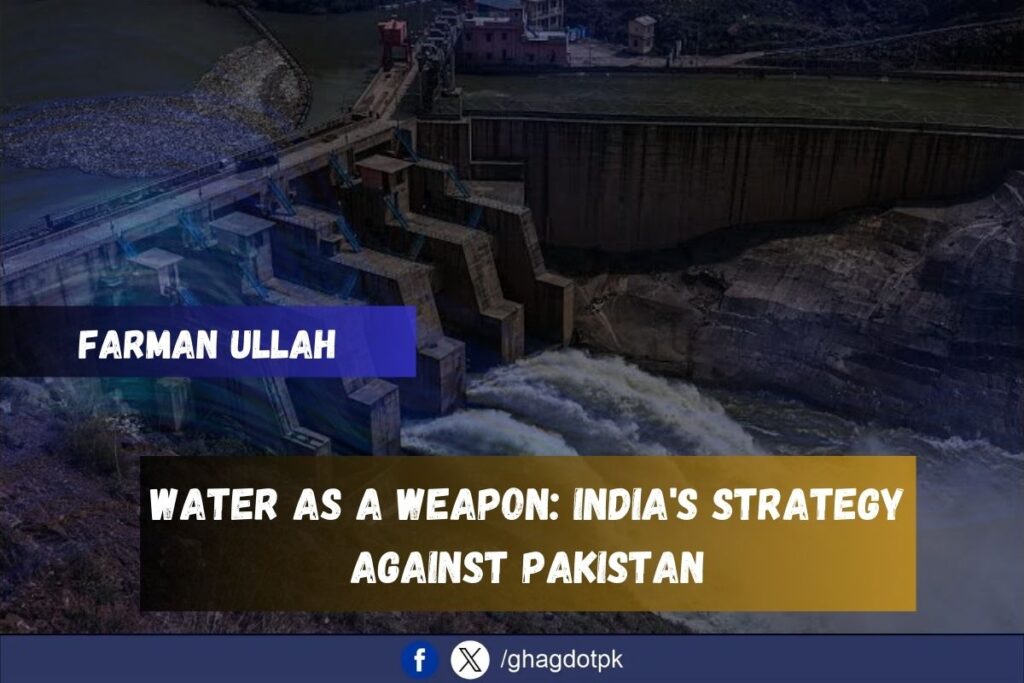By Farman Ullah
India’s decision to declare the Indus Waters Treaty (IWT) “in abeyance” is a significant development that raises concerns about the future of water cooperation between India and Pakistan. The IWT has been a cornerstone of water diplomacy between the two countries since its signing in 1960. However, India’s unilateral attempt to suspend the treaty is not supported by international law.
According to the Vienna Convention on the Law of Treaties (VCLT), a treaty can only be suspended or terminated if there’s a mutual agreement between the parties involved or if one party commits a serious breach. India’s actions seem to be a unilateral attempt to renegotiate the treaty, which is not permissible under international law. This move by India has sparked concerns about its commitment to international cooperation and the rule of law.
What is the Indus Waters Treaty?
The Indus Waters Treaty (IWT) is a treaty signed in 1960 between India, Pakistan, and the World Bank. The treaty governs the use of river waters in the Indus basin and allocates certain rivers to Pakistan (Indus, Jhelum, and Chenab) and others to India (Ravi, Beas, and Sutlej). The treaty aims to promote cooperation and peaceful use of water resources between the two countries.
The IWT has been instrumental in managing water resources in the Indus basin and has helped to prevent conflicts over water between India and Pakistan. The treaty has also facilitated cooperation on water-related issues, including hydropower generation, irrigation, and flood management. However, the treaty has faced challenges and controversies over the years, particularly with regards to India’s plans to build dams and hydropower projects on the rivers allocated to Pakistan.
India’s Violations
India’s interference with the flow of the Chenab River is a clear violation of the IWT. The treaty obligates India to refrain from interfering with the flow of the Indus, Jhelum, and Chenab rivers. India’s actions have significant implications for Pakistan’s water security and economy. By interfering with the flow of the Chenab River, India is not only violating the treaty but also affecting the livelihoods of millions of people in Pakistan.
India’s violations of the treaty are not limited to the Chenab River. There have been several instances of India violating the treaty by building dams and hydropower projects on the rivers allocated to Pakistan without obtaining the necessary approvals or providing adequate notice to Pakistan. These actions by India have raised concerns about its commitment to the treaty and its willingness to cooperate with Pakistan on water-related issues.
Pakistan’s Rights
Pakistan has the right to dispute resolution through international fora, including the Permanent Court of Arbitration. The IWT provides for two methods of dispute resolution: technical disputes can be referred to a neutral expert, while treaty violations and questions of interpretation can be referred to the Permanent Court of Arbitration. Pakistan can seek redress for India’s violations of the treaty through these mechanisms.
Pakistan has consistently maintained that it wants to resolve disputes over the IWT through peaceful means and in accordance with international law. However, India’s actions have made it clear that Pakistan needs to take a more assertive approach to protect its rights under the treaty. Pakistan’s rights under the treaty are not limited to dispute resolution; it also has the right to expect India to comply with its obligations under the treaty.
International Law
India’s actions constitute an internationally wrongful act, and it is obligated to pay reparations to Pakistan for the damage caused. The principle of “pacta sunt servanda” (agreements must be honored) is a fundamental principle of international law. India’s violations of the treaty also raise concerns about its commitment to international law and cooperation.
The Vienna Convention on the Law of Treaties (VCLT) provides a framework for the negotiation, conclusion, and operation of treaties. The VCLT also provides rules for the interpretation and application of treaties, including the principle of good faith and the rule of pacta sunt servanda. India’s actions are a clear breach of these principles and rules.
Water as a Weapon
India’s actions also raise concerns about the use of water as a weapon. International law prohibits the destruction or diversion of natural resources, including rivers, for military objectives. The use of water as a weapon can have devastating consequences for civilians and the environment. Pakistan has the right to protect its water resources and seek redress for any damage caused by India’s actions.
The use of water as a weapon is a serious issue that requires attention from the international community. The United Nations has recognized the importance of protecting water resources and preventing their use as a weapon. Pakistan has consistently called for international cooperation to prevent the use of water as a weapon and to promote peaceful resolution of water-related disputes.
India’s declaration of the IWT “in abeyance” is not valid under international law. Pakistan has the right to protect its interests and seek dispute resolution through international fora.






